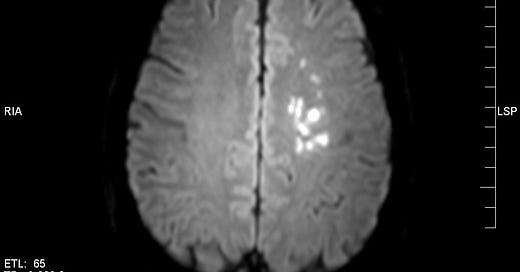I'll never forget when a marine scientist from Stony Brook rushed up to me at some meeting maybe seven years ago, smiling widely and yelling, "Andy, I had your stroke!" She'd read my New York Times essay on my "lucky" 2011 stroke and it had lodged in her brain so that when she experienced "word salad" walking down a Manhattan block, she and her husband knew what to do.
Here’s my “luck stroke tale” - reposted on Substack to sustain awareness, and responsiveness
During a rare run in the woods with my super-fit elder son on a hot Fourth of July weekend in 2011, my brain — which I hardly ever think about — gave me a strong hint something was seriously wrong with the inputs it was receiving from my eyes.
My left eye was telling my brain the world was paisley. My right eye was, “meh.”
Thank you, brain.
If it hadn’t been for you, I wouldn’t have scarfed down half a dozen baby aspirin as I considered the possibility I was having a stroke. If it hadn’t been for that semi-instinctive move before my son drove me to the hospital, my scan would almost surely have looked far worse than this (the white areas being dead stuff):
As I learned later, and explained in The New York Times and in a live Story Collider event, the aspirin move could have killed me, but in this case likely saved me from a far worse outcome. It was indeed a lucky stroke.
What’s below is a slightly reworked repost of how I laid things out on my Dot Earth blog some years back. Every anniversary, I’ll repeat the drill — until every month is Stroke Awareness Month.
This Twitter item, which I posted from the hospital, says a lot, as well:
I blogged on my cerebral misadventure as it unfolded, including this photo taken by my brother, Jim, showing another manifestation of the “Horner’s Syndrome” that caused the conflicting visual signals in the early stages of my cerebral misadventure (note the difference in pupil dilation):

But I only got around to writing up an article about it in 2013, after Ben Lillie, who left high-energy physics to focus on science storytelling and co-created Story Collider, invited me to tell my stroke tale as part of a special story slam in Brooklyn focused on brain science. The event was part of Brain Awareness Week.) Here’s the Soundcloud player with my tale, as related to a roomful of Brooklynites in March, 2013 (I think you’ll enjoy it; no kidding):
Here are some prime take-home points:
Take your body seriously.
Time (wasted) is brain (lost).
Question authority, but not too much.
Old habits die hard.
Here’s my Times story, which begins with a marvelous run in the woods with my elder son on that hot summer day in 2011. And here’s my videotaped discussion of my experience with David Corcoran, the editor of Science Times.
One focus is the substantial — and still largely untapped — opportunity to speed stroke diagnosis and treatment through telemedicine, which can connect a top stroke specialist with any suitably equipped emergency room (or even ambulance).
Click here — “The Doctor is Not in, But WILL See you Now” — for my video interview with Bart Demaerschalk, director of the Mayo Clinic Telestroke Program in Arizona and the lead author on an important paper demonstrating the method’s cost effectiveness.
I also encourage you to watch this video interview with Yulun Wang, the inventor of the technologies that facilitate long-distance stroke diagnosis and care:
Here’s a great Facebook page from the National Institutes of Health: “Know Stroke.”
And please click over to Facebook for a searing, piercing, draining, exasperating account of a different stroke experienced by David Talbot, the co-founder of Salon. Here’s the lede and link:
Between Heaven and Hell: Tales From the Stroke Ward
Before my ocean of feelings about my stroke — and the five weeks I spent in a stroke ward — — begin to evaporate (as even the most overwhelming experiences can and do), I want to record some observations about my sojourn at San Francisco’s Davies Hospital and the care I received there from its staff. My hospitalization still haunts me and terrifies me — and makes me believe in people’s depthless capacity for love and compassion. When I tell stories about my weird and wonderful ordeal to friends and family, my heart begins to race, and I even worry about having another stroke. But I need to convey some sense of the experience, and how it changed my life forever — and to pay tribute to the circle of complete strangers who for five intense weeks became my family.
Btw, I’ll return to this subject now and then in future posts — sorry, it’s going to take some time to process and I’m never just going to “move on.” I don’t want to. I want to always hold on to what I went though, and what I’ve become. Of course, you keep changing after a stroke, and who knows who I’ll be in another five months? But for now, I still have a strange sense of floating outside myself. I’m in my wounded, slowly healing body, but I’m not. I’m alive, but not fully.
This hybrid existence gives me a different perspective on my life — and all my life-long passions (love, family, friendship, politics, journalism, music, film, food, the grand human parade, this mortal coil and whatever looms beyond, if anything). Everything is less intense these days, I see things in more proportion and with greater balance. And everything is MORE intense. My emotions can be as volatile and unpredictable as a high-mountain summer storm. [READ THE REST]







